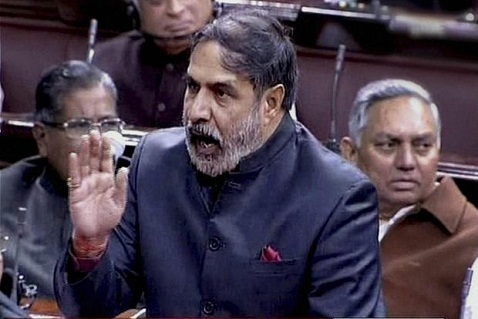Last Updated on March 11, 2020 8:23 pm by INDIAN AWAAZ
Voices concern over growing popularity of crypto-currency markets and their abuse by drug mafia
Suggests Planning Board and Investment Agency to be created for J&K to speed up development
Our Correspondent / New Delhi

Department-related Parliamentary Standing Committee on Home Affairs has called for consensus among States regarding upcoming Census and National Population Register (NPR).
The Committee recommended the MHA to explore the feasibility of using the Aadhaar metadata for the Census and updation of NPR in 2020-21 and all the States/UTs should be fully convinced on various issues pertaining to the NPR which commences from April, 2020 to have a national consensus so that there is absolute clarity and no apprehension among remaining people across the country which will help in conducting these exercises in a smooth manner.
The Standing Committee on Home Affairs, led by Mr Anand Sharma, Rajya Sabha Member, presented its 224th Report on Demands for Grants (2020-21) of the Ministry of Home Affairs in Rajya Sabha on March 05.
The Committee had recommended that the allocation under the Capital Head for the Union Territories (without legislature) should be increased for creation of assets particularly infrastructure and ensuring that the developmental projects of the UTs does not gets hampered due to shortage of funds. The Committee, also, recommended that the Ministry must review the capital requirements of the eight UTs (including two newly created Union Territories of J&K and Ladakh) in the first half of the next fiscal year, expedite the developmental projects in these UTs and project a higher demand for allocation to the Ministry of Finance at RE stage.
The Committee while appreciating the work done by National Disaster Relief Force (NDRF) for disaster management in the country, had recommended that the Study Teams should make a preliminary visit to the disaster affected areas, within a week of the disaster for quick and initial assessment of the damage. Preliminary damage assessment, if, done jointly with the concerned State Governments, then chances of differences in assessment of damage is likely to be minimized. The Committee also recommended preparing and engaging communities to deal with all phases of a Disaster: preparedness, prevention, mitigation, response, and recovery. The Committee suggested that in the pattern of National Cadet Corps (NCC), a Disaster Management Training Corps (DMTC) can be initiated in schools and colleges not only to play the role of a strong civilian corps to support the Disaster Management Teams but also to disseminate the practices in disaster management at the community level.
The Committee noted a meager increase of 2% under Demand No. 48 (Police) which becomes negligible considering inflationary effect and does not seem to be in sync with the tasks of the Police. The Committee opined that the modernization and technology up-gradation is a continuous process necessitating keeping of adequate budgetary allocation and the expenditure made on capital outlay during peacetime is like building a block for the Forces which builds a strong Force/organization in the long run.
Expressing concern over the vacancies in Central Armed Police Forces (CAPFs), the Committee recommended that the recruitment process be devised in such a way that the recruitment agencies are informed well in time of all the existing and anticipated vacancies. The Committee also recommended that due representation be given to the youths from tribal and remote areas.
The Committee observed that just like Army Personnel, the CAPF personnel are also posted in the treacherous, mountainous and snowy terrains. Therefore, CAPFs personnel needs to be given the Risk and Hardship allowance as admissible to Army personnel. The Committee opined that parity on the payment of such allowances should be maintained between troops that are deployed in similar areas. This will go a long way in boosting the morale of the deployed CAPF personnel in tough condition and areas.
The Committee expressed its concern on the increasing popularity of crypto-currencies, “darknet” markets that have grown where drug traffickers are using encryption software to protect their communications, data and money which makes it difficult to track and seize drugs and recommended that a critical analysis of intelligence inputs on drug trafficking routes should also be done and officers of the Narcotics Control Bureau should be imparted requisite knowledge and skills through befitting training to prevent, investigate and disrupt drug trafficking. The Committee also emphasized on developing cooperation and information-sharing mechanism between regional, national and international law enforcement agencies to combat the growing and fast-changing activities of drug traffickers especially on the International Borders.
Regarding the newly created UT of J&K, the Committee emphasized the need for proper physical and social infrastructures like land, capital, storage, roads, railways, air connectivity, communication, power, skilled workforce to attract new industries and entrepreneurs into J&K. The Committee also recommended setting up a Planning Board and investment promotion agency in J&K in a stipulated time to formulate investment plans and coordinate with the industries from various sectors and countries to increase investment in J&K. Further, the MHA should also hold periodic meetings with the Planning Board for guidance and addressing the issues with the concerned Ministries of the Government of India.
The full report is available on the website of Rajya Sabha http://rajyasabha.nic.in > Committees > Department Related – RS > Committee on Home Affairs >
